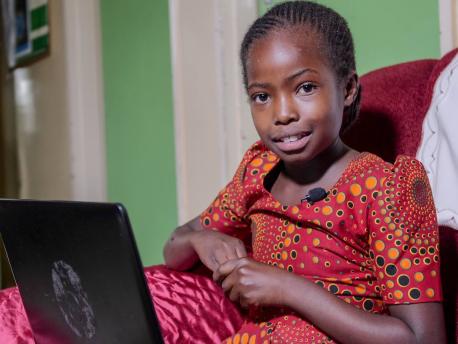
A Passport That Gives Children the Freedom to Learn Online and Off
When the COVID-19 pandemic forced children and young people to shift to remote learning, UNICEF, Microsoft Corporation and partners took the cue to expand the Learning Passport, a global online, mobile and offline learning platform that can help youth continue their education during emergencies that result in school closures.
Any emergency can bring children's education to a standstill. Some can continue their schooling via online lessons and radio broadcasts, but the more vulnerable, including girls, refugee children and those living in poverty, have too often watched their chances to learn vanish.
'"I had access to zero platforms during the lockdown," says Roosevelt Girls' High School student Ruvarashe, who lives in Zimbabwe.
COVID-19 closures in Zimbabwe interrupted the education of 5 million students. Schools fully reopened for the 2020-2021 academic year, but a poverty gap persists among learners. Connectivity at home is inadequate in some communities, and only about 31 percent of schools have internet access.
To support all children's right to education, UNICEF collaborated with the Zimbabwe government and Microsoft to give kids and young people free access to the Learning Passport. The platform, a high-quality, free alternative to Zimbabwe’s paid e-learning platforms, hosts 1,000 radio lessons, syllabuses, teacher guides and resources along with audio lessons, online books, videos and interactive content.
With so many options, Ruvarashe can take control of her education, and doesn't need to fear future school closures.
"What I like most about the Learning Passport is I can do some of the things on my own," she says in the video above.
When Zimbabwe launched the mobile version of the Learning Passport in March, 70,000 users registered in the first week — 25 percent of UNICEF and partners' goal for 2021. The Giga project has also been working in Zimbabwe since early 2020 to realize its global mission to connect every young person and school to the internet. A partnership between UNICEF and ITU (the United Nations' International Telecommunication Union), Giga uses schools as a base point to identify a country's connectivity gaps. This information, combined with existing ITU mapping data, is now being used to help Zimbabwe take stock of its existing infrastructure in order to bring over 6,000 schools online. The project also entails identifying ways to reduce data costs for schools and students.
Top photo: Zimbabwe's launch of the Learning Passport platform means more students like 9-year-old Rufaro, who has both a laptop and internet access at home, can study remotely. © UNICEF/UN0411304/Tinago. Video by Tong Su for UNICEF USA.
HOW TO HELP
There are many ways to make a difference
War, famine, poverty, natural disasters — threats to the world's children keep coming. But UNICEF won't stop working to keep children healthy and safe.
UNICEF works in over 190 countries and territories — more places than any other children's organization. UNICEF has the world's largest humanitarian warehouse and, when disaster strikes, can get supplies almost anywhere within 72 hours. Constantly innovating, always advocating for a better world for children, UNICEF works to ensure that every child can grow up healthy, educated, protected and respected.
Would you like to help give all children the opportunity to reach their full potential? There are many ways to get involved.





